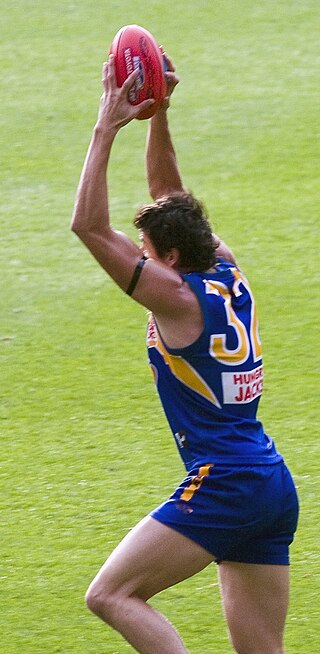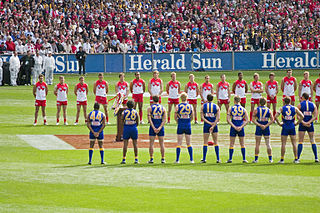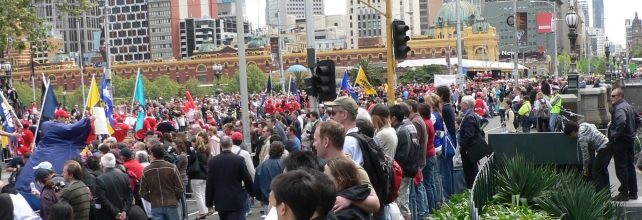
The Western Bulldogs are a professional Australian rules football team that competes in the Australian Football League (AFL), the sport's premier competition.
The 1999 AFL season was the 103rd season of the Australian Football League (AFL), the highest level senior Australian rules football competition in Australia, which was known as the Victorian Football League until 1989. The season featured sixteen clubs, ran from 25 March until 25 September, and comprised a 22-game home-and-away season followed by a finals series featuring the top eight clubs.

Andrew Embley is a former Australian rules footballer who played with the West Coast Eagles in the Australian Football League (AFL). He is known for winning the Norm Smith Medal as the best player in the 2006 AFL Grand Final.
The 2006 AFL season was the 110th season of the Australian Football League (AFL), the highest level senior Australian rules football competition in Australia, which was known as the Victorian Football League until 1989. The season featured sixteen clubs, ran from 30 March until 30 September, and comprised a 22-game home-and-away season followed by a finals series featuring the top eight clubs.
Rivalries in the Australian Football League exist between many teams, most of which typically draw large crowds and interest regardless of both teams' positions on the ladder. The AFL encourages the building of such rivalries, as a method of increasing publicity for the league, to the point of designating one round each year as "Rivalry Round" when many of these match-ups are held on the one weekend. Whilst some rivalries, such as between teams from adjacent areas, are still strong, the designation of an entire round of fixtures as a Rivalry Round is often criticised due to some arbitrary match-ups, or ignoring stronger and more recent rivalries.
The 1991 AFL season was the 95th season of the Australian Football League (AFL), which was known previously as the Victorian Football League until 1989. The season ran from 22 March until 28 September, and comprised a 22-game home-and-away season followed by a finals series featuring the top six clubs, an increase from the top five clubs which had contested the finals since 1972.
The 1996 AFL season was the 100th season of the Australian Football League (AFL), the highest level senior Australian rules football competition in Australia, which was known as the Victorian Football League until 1989. The season featured sixteen clubs and ran from 29 March until 28 September. It comprised a 22-game home-and-away season followed by a finals series featuring the top eight clubs, as well as several celebrations of the league's centenary.
The 1995 AFL season was the 99th season of the Australian Football League (AFL), the highest level senior Australian rules football competition in Australia, which was known as the Victorian Football League until 1989.
The 1987 VFL season was the 91st season of the Victorian Football League (VFL). The season ran from 27 March until 26 September, and comprised a 22-game home-and-away season followed by a finals series featuring the top five clubs.
The 1986 VFL season was the 90th season of the Victorian Football League (VFL), the highest level senior Australian rules football competition in Victoria. The season featured twelve clubs, ran from 29 March until 27 September, and comprised a 22-game home-and-away season followed by a finals series featuring the top five clubs.
The 1985 VFL season was the 89th season of the Victorian Football League (VFL), the highest level senior Australian rules football competition in Victoria.
The 1984 VFL season was the 88th season of the Victorian Football League (VFL), the highest level senior Australian rules football competition in Victoria. The season featured twelve clubs, ran from 31 March until 29 September, and comprised a 22-game home-and-away season followed by a finals series featuring the top five clubs.
The 1983 VFL season was the 87th season of the Victorian Football League (VFL), the highest level senior Australian rules football competition in Victoria.
The 1960 VFL season was the 64th season of the Victorian Football League (VFL), the highest level senior Australian rules football competition in Victoria. The season featured twelve clubs, ran from 16 April until 24 September, and comprised an 18-game home-and-away season followed by a finals series featuring the top four clubs.
The 1979 VFL season was the 83rd season of the Victorian Football League (VFL), the highest level senior Australian rules football competition in Victoria. The season featured twelve clubs, ran from 31 March until 29 September, and comprised a 22-game home-and-away season followed by a finals series featuring the top five clubs.
The 1982 VFL season was the 86th season of the Victorian Football League (VFL), the highest level senior Australian rules football competition in Victoria. The season featured twelve clubs, ran from 20 March until 25 September, and comprised a 22-game home-and-away season followed by a finals series featuring the top five clubs.
The 1977 VFL season was the 81st season of the Victorian Football League (VFL), the highest level senior Australian rules football competition in Victoria. The season featured twelve clubs, ran from 2 April until 1 October, and comprised a 22-game home-and-away season followed by a finals series featuring the top five clubs.
The AFL Australian Football League is the top professional Australian rules football league in the world. The league consists of eighteen teams: nine based in the city of Melbourne, one from regional Victoria, and eight based in other Australian states. The reason for this unbalanced geographic distribution lies in the history of the league, which was based solely within Victoria from the time it was established in 1897, until the time the league expanded through the addition of clubs from interstate to the existing teams starting in the 1980s; until this expansion, the league was known as the VFL (Victorian Football League).

Thomas Mitchell is a professional Australian rules footballer playing for the Collingwood Football Club in the Australian Football League (AFL). He previously played for the Sydney Swans from 2012 to 2016, and the Hawthorn Football Club between 2017 and 2022. Mitchell won the Brownlow Medal as the league's best and fairest player in 2018 and set the record for the most disposals in a VFL/AFL match, accruing 54 in a game against Collingwood during that season. Whom he would later join in 2023, en route to winning the 2023 AFL Grand Final and his first AFL premiership.

The West Coast Eagles is an Australian rules football club based in Perth, Western Australia, currently playing in the Australian Football League (AFL). The club was formed in 1986, and played its first season in the competition in 1987. Having lost the 1991 grand final to Hawthorn, the club won premierships in 1992 and 1994, becoming one of the most successful teams of the 1990s. West Coast won its third premiership in 2006, but declined afterwards, finishing last in 2010, before undergoing a rapid resurgence the following season to finish fourth in 2011.








